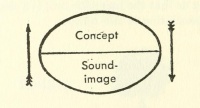Association (psychology)
From The Art and Popular Culture Encyclopedia
|
"The human mind . . . operates by association. With one item in its grasp, it snaps instantly to the next that is suggested by the association of thoughts, in accordance with some intricate web of trails carried by the cells of the brain." Vannevar Bush, As We May Think (1945) |

|
Related e |
|
Featured: |
Association in psychology refers to a connection between concepts or mental states that results from the similarity between those states or their proximity in space or time. The idea stems from Plato and Aristotle, especially with regard to the succession of memories, and it was carried on by philosophers such as John Locke, David Hume, David Hartley, James Mill, John Stuart Mill, and Alexander Bain. It finds its place in modern psychology in such areas as conditioning and in neural network models of memory.
Contents |
Overview
The following discussion assumes the point of view of associationistic theory. Some modern theorists disagree with this approach; they argue that it is very misleading to try to understand mental or brain function as a network of associations .
Memory
Memory seems to operate as a chain of associations: concepts, words and ideas are interlinked, so that stimuli such as a person’s face will call up the associated name. Understanding the relationships between different items is fundamental to episodic memory, and damage to the hippocampal region of the brain has been found to hinder learning of associations between objects.
Pavlovian/Classical conditioning
Classical conditioning is an example of associationistic learning. In his famous experiment, Pavlov paired the sound of a bell with food, and later the dog salivated to the bell alone, indicating that an association had been established between the bell and food.
Operant conditioning
In operant conditioning behaviors increase in strength and/or frequency when they have been followed by reward. This is theorized to follow from an association between the behavior and a mental representation of the reward (such as food).
Implicit association
Associations in humans can be measured with the Implicit Association Test, a psychological test which measures the implicit (subconscious) relation between two concepts. It has been used in investigations of subconscious racial bias. The test measures the associations between different ideas, such as race and crime. Reaction time is used to distinguish associations; faster reaction time is an indicator of a stronger association.
See also
- Association
- Association of Ideas
- Associationism
- Conditioning
- Comprehension
- Conditioning
- Halo effect
- Pair by association
- Memory


